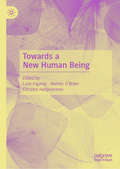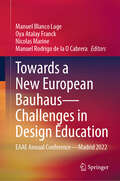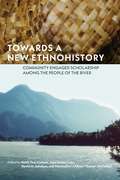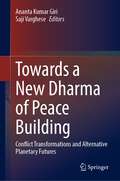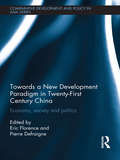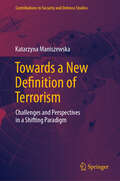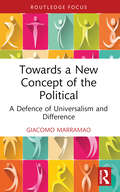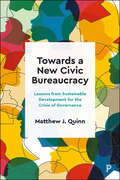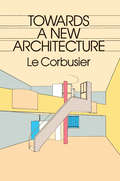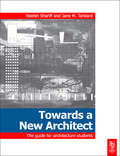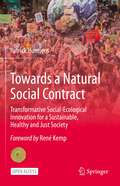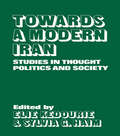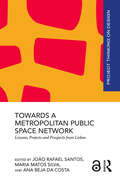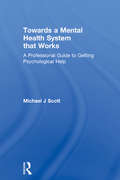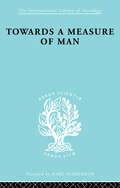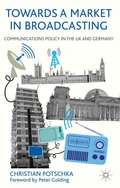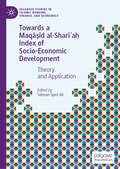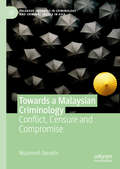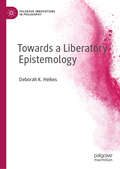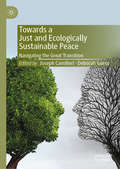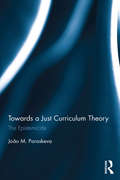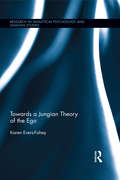- Table View
- List View
Towards a New Human Being
by Luce Irigaray Mahon O'Brien Christos HadjioannouWith my own introduction and epilogue, Towards a New Human Being gathers original essays by early career researchers and established academic figures in response to To Be Born, my most recent book. The contributors approach key issues of this book from their own scientific fields and perspectives – through calls for a different way of bringing up and educating children, the constitution of a new environmental and sociocultural milieu or the criticism of past metaphysics and the introduction of new themes into the philosophical horizon. However, all the essays which compose the volume correspond to proposals for the advent of a new human being – so answering the subtitle of To Be Born: Genesis of a New Human Being. To Be Born thus acts as a background from which each author had the opportunity to develop and think in their own way. As such Towards a New Human Being is part of a longer-term undertaking in which I engaged together and in dialogue with more or less confirmed thinkers with a view to giving birth to a new human being and building a new world.–Luce Irigaray
Towards a New Human Being
by Luce Irigaray Mahon O'Brien Christos HadjioannouWith my own introduction and epilogue, Towards a New Human Being gathers original essays by early career researchers and established academic figures in response to To Be Born, my most recent book. The contributors approach key issues of this book from their own scientific fields and perspectives – through calls for a different way of bringing up and educating children, the constitution of a new environmental and sociocultural milieu or the criticism of past metaphysics and the introduction of new themes into the philosophical horizon. However, all the essays which compose the volume correspond to proposals for the advent of a new human being – so answering the subtitle of To Be Born: Genesis of a New Human Being. To Be Born thus acts as a background from which each author had the opportunity to develop and think in their own way. As such Towards a New Human Being is part of a longer-term undertaking in which I engaged together and in dialogue with more or less confirmed thinkers with a view to giving birth to a new human being and building a new world.–Luce Irigaray
Towards a New European Bauhaus—Challenges in Design Education: EAAE Annual Conference—Madrid 2022
by Manuel Blanco Lage Oya Atalay Franck Nicolas Marine Manuel Rodrigo de la O CabreraThis book gathers the latest advances and innovations in the field of architectural and design education, as presented at the 2022 annual conference of the European Association for Architectural Education (EAAE AC), “Towards a New European Bauhaus - Challenges in Design Education”, hosted by ETSAM Madrid School of Architecture of the Universidad Politécnica de Madrid, in Madrid, Spain, on August 31–September 2, 2022.
Towards a New Ethnohistory: Community-Engaged Scholarship among the People of the River
by John Sutton Lutz Keith Thor Carlson David M. Schaepe Naxaxalhts’i – McHalsie"Towards a New Ethnohistory" engages respectfully in cross-cultural dialogue and interdisciplinary methods to co-create with Indigenous people a new, decolonized ethnohistory. This new ethnohistory reflects Indigenous ways of knowing and is a direct response to critiques of scholars who have for too long foisted their own research agendas onto Indigenous communities. Community-engaged scholarship invites members of the Indigenous community themselves to identify the research questions, host the researchers while they conduct the research, and participate meaningfully in the analysis of the researchers’ findings. The historical research topics chosen by the Stó:lō community leaders and knowledge keepers for the contributors to this collection range from the intimate and personal, to the broad and collective. But what principally distinguishes the analyses is the way settler colonialism is positioned as something that unfolds in sometimes unexpected ways within Stó:lō history, as opposed to the other way around. This collection presents the best work to come out of the world’s only graduate-level humanities-based ethnohistory field school. The blending of methodologies and approaches from the humanities and social sciences is a model of twenty-first century interdisciplinarity.
Towards a New Dharma of Peace Building: Conflict Transformations and Alternative Planetary Futures
by Ananta Kumar Giri Saji VargheseThis volume deals with a new Dharma of peacebuilding and conflict transformations, drawing on the world's philosophical, religious, and spiritual traditions and many recent initiatives and experiments with peace. It deals with issues of sustainable peace, Dharma and Ubuntu of peace from African traditions, neurological insights of peacebuilding, traditions of conscientious objection, Satyagraha, possibilities of Gandhian Ahimsa, and moral and ethical limits of conflict and conflict resolution. It also presents the works of peace thinkers and activists such as Spinoza, Abhinavagupta, Tolstoy, Gandhi, Ulrich Beck, and others. It offers new initiatives and experiments in peace in different parts of the world—Palestine-Israel, Colombia, the Middle East, India, and South Africa. This pioneering and handy book is of interest to students, scholars, teachers, and activists working in peace and conflict studies, development studies, cultural studies, and religious studies as well as in different civil society organizations around the world.
Towards a New Development Paradigm in Twenty-First Century China: Economy, Society and Politics (Comparative Development and Policy in Asia)
by Eric FlorenceThis book argues that the current state of China requires an important paradigm shift in the way the party-state manages the country’s development, and goes on to assess the fitness of the party-state for implementing such a paradigm shift and the likelihood of the party-state bringing this about. It brings together an examination of the very latest situation in a range of key areas where current developments have the potential to undermine substantially the status quo, areas such as the recent economic crisis and the resulting economic slowdown, increasing labour unrest, mounting calls for social justice, worsening urban-rural disparity, the urgent need to implement social welfare programmes, the rise of civil society, and the impact of new media. Overall, the book provides a thorough appraisal of the difficulties which China currently faces.
Towards a New Definition of Terrorism: Challenges and Perspectives in a Shifting Paradigm (Contributions to Security and Defence Studies)
by Katarzyna ManiszewskaThis book addresses critical questions in the field of terrorism studies that have long eluded consensus in the international community. It discusses why there is an abundance of definitions of terrorism and, on the other hand, the absence of a standard definition of terrorism reflected at the international level, shedding light on the elusive boundaries for achieving a global consensus. The book's two compelling hypotheses pave the way for a fresh perspective on counterterrorism efforts. Firstly, the need for new legal frameworks that adapt to the evolving nature of terrorism, encompassing state-sponsored terrorism. Secondly, by examining the historical roots of terrorism, this book uncovers patterns that could reshape future counterterrorism strategies. Drawing on interviews with 20 leading experts in terrorism studies from diverse backgrounds and regions, this book provides invaluable insights and ensures a well-rounded examination of the subject. It will appeal to students, scholars, and researchers of security studies, political science, international relations, and terrorism studies in particular, as well as policy-makers interested in exploring the complexities of countering terrorism in our ever-changing world.
Towards a New Concept of the Political: A Defence of Universalism and Difference (Critiques and Alternatives to Capitalism)
by Giacomo MarramaoThis book addresses the current crisis of democratic politics and its phase of ‘interregnum’ – in which the past finds it hard to die and the future finds it difficult to be born – by proposing a radical redefinition of the concept of the Political. Drawing on the thoughts of Antonio Gramsci and Walter Benjamin among others, it explores the meaning of the lemma auctoritas – the opposition between authority and power – and offers a comparison of the Frankfurt School’s radical critique of power with Georges Bataille’s critique of political economy and consumerist productivism, demonstrating how the two ultimately converge. Based on an ontology of the present that is critical of ‘identity obsession’ and advances instead a universalism of difference, the author proposes a new understanding of politics founded not on ‘vertical’ domination but on a ‘horizontal’ recomposition of subjectivities, allowing interaction and acting-in-common between different forms of life. This book will therefore appeal to scholars of social and political theory.
Towards a New Civic Bureaucracy: Lessons from Sustainable Development for the Crisis of Governance
by Matthew J. QuinnIn this timely analysis, Matthew J. Quinn plots a landmark reimagination of governance and public administration, underpinned by sustainable development and civic republicanism. He draws on governance literature and Foucault’s concept of governmentality to demonstrate the anachronism of existing bureaucratic norms and how these have thwarted sustainability and fuelled right-wing populism. Using international examples and the author’s own extensive experience in sustainability governance as a senior UK official, the book proposes a new civic bureaucracy which fosters societal engagement and dialogue. It sheds new light on debates about the emerging crisis of governance, the role of public bureaucracy and the means to embed sustainability in governance.
Towards a New Architecture (Dover Architecture Ser.)
by Le CorbusierFor the Swiss-born architect and city planner Le Corbusier (Charles-Édouard Jeanneret, 1887–1965), architecture constituted a noble art, an exalted calling in which the architect combined plastic invention, intellectual speculation, and higher mathematics to go beyond mere utilitarian needs, beyond "style," to achieve a pure creation of the spirit which established "emotional relationships by means of raw materials." The first major exposition of his ideas appeared in Vers une Architecture (1923), a compilation of articles originally written by Le Corbusier for his own avant-garde magazine, L'Esprit Nouveau. The present volume is an unabridged English translation of the 13th French edition of that historic manifesto, in which Le Corbusier expounded his technical and aesthetic theories, views on industry, economics, relation of form to function, the "mass-production spirit," and much else. A principal prophet of the "modern" movement in architecture, and a near-legendary figure of the "International School," he designed some of the twentieth century's most memorable buildings: Chapel at Ronchamp; Swiss dormitory at the Cité Universitaire, Paris; Unité d'Habitation, Marseilles; and many more.Le Corbusier brought great passion and intelligence to these essays, which present his ideas in a concise, pithy style, studded with epigrammatic, often provocative, observations: "American engineers overwhelm with their calculations our expiring architecture." "Architecture is stifled by custom. It is the only profession in which progress is not considered necessary." "A cathedral is not very beautiful . . ." and "Rome is the damnation of the half-educated. To send architectural students to Rome is to cripple them for life." Profusely illustrated with over 200 line drawings and photographs of his own works and other structures he considered important, Towards a New Architecture is indispensable reading for architects, city planners, and cultural historians ― but will intrigue anyone fascinated by the wide-ranging ideas, unvarnished opinions, and innovative theories of one of this century's master builders.
Towards a New Architect
by Yasmin Shariff Jane TankardAfter three years of education, architecture students have to start out on their first year of practical training as the initial step in a career in the professional world--all too often without enough clear advice to make sure that their first step is in the right direction.Towards a New Architect helps you to make the right moves. It explores how to research the opportunities available, prepare your CV, make sure that it gets you noticed for the right reasons and deliver a successful interview as part of a clear plan for building your career as an architect. For many architecture students the ultimate goal in their career is to set up in practice for themselves. This book sets out the steps to get there successfully and to make the process enjoyable and fulfilling.
Towards a New Age Graphic Design class 12 - NCERT
by National Council of Educational Research and TrainingHow do designers get ideas and create the attractive websites? This book Towards a New Age Graphic Design for std 12 published by the NCERT gives insight for forms, fonts, and colours inside the design annuals and monographs of designing work. Written in simple English it follows the guidelines by the CBSE board.
Towards a Natural Social Contract: Transformative Social-Ecological Innovation for a Sustainable, Healthy and Just Society
by Patrick HuntjensThis open access book states that the societal fault lines of our times are deeply intertwined and that they confront us with challenges affecting the security, fairness and sustainability of our societies. The author, Prof. Dr. Patrick Huntjens, argues that overcoming these existential challenges will require a fundamental shift from our current anthropocentric and economic growth-oriented approach to a more ecocentric and regenerative approach. He advocates for a Natural Social Contract that emphasizes long-term sustainability and the general welfare of both humankind and planet Earth. Achieving this crucial balance calls for an end to unlimited economic growth, overconsumption and over-individualisation for the benefit of ourselves, our planet, and future generations. To this end, sustainability, health, and justice in all social-ecological systems will require systemic innovation and prioritizing a collective effort. The Transformative Social-Ecological Innovation (TSEI) framework presented in this book serves that cause. It helps to diagnose and advance innovation and spur change across sectors, disciplines, and at different levels of governance. Altogether, TSEI identifies intervention points and formulates jointly developed and shared solutions to inform policymakers, administrators, concerned citizens, and professionals dedicated towards a more sustainable, healthy and just society. A wide readership of students, researchers, practitioners and policy makers interested in social innovation, transition studies, development studies, social policy, social justice, climate change, environmental studies, political science and economics will find this cutting-edge book particularly useful.“As a sustainability transition researcher, I am truly excited about this book. Two unique aspects of the book are that it considers bigger transformation issues (such as societies’ relationship with nature, purpose and justice) than those studied in transition studies and offers analytical frameworks and methods for taking up the challenge of achieving change on the ground.”- Prof. Dr. René Kemp, United Nations University and Maastricht Sustainability Institute
Towards a Modern Iran: Studies in Thought, Politics and Society
by Elie Kedourie and Sylvia G. HaimFirst Published in 1980. Routledge is an imprint of Taylor & Francis, an informa company.
Towards a Metropolitan Public Space Network: Lessons, Projects and Prospects from Lisbon (Project Thinking on Design)
by Maria Matos Silva João Rafael Santos Beja da Costa, AnaThis book explores the hypothesis that public space – if conceptualised, imagined, and shaped at the metropolitan scale, through innovative territorial design approaches – offers the possibility to interconnect and integrate various systems in search for synergic responses to emerging societal challenges that impact large, urbanised landscapes.The book offers a multidimensional and multi-geographic framework to discuss the role of public space on contemporary metropolitan territories, as part of MetroPublicNet - Building the foundations of a Metropolitan Public Space Network to support the robust, low-carbon and cohesive city: Projects, lessons, and prospects in Lisbon research project. The reader will find a critical and overarching perspective on the conceptual, methodological, and empirical lenses that unfolded throughout the research process, namely a systematised decoding of the public space projects, policies, and rationales that shaped the recent transformation of Lisbon Metropolitan Area. With a diverse range of authors actively engaged in academic research and professorship, in design practice, and in policy-oriented roles, the book concludes with the outlining of forward-looking guidelines, policy recommendations, and design experimentations. This book will be of interest to researchers and students of architecture, urbanism, landscape architecture and geography.
Towards a Mental Health System that Works: A professional guide to getting psychological help
by Michael J ScottResearch has established that there are efficacious psychological therapies for most common mental disorders. In Towards a Mental Health System That Works, psychologist Michael J Scott details the reforms necessary to ensure that consumers of services receive an evidence-based treatment. This book examines: the social significance of interventions that target mental-wellbeing and psychological disorder why treatments are ‘lost in translation’ from research to routine practice steps that can be taken towards a translation that better recognises the complexity of research and ensures fidelity to an evidence-based treatment protocol the deleterious effects of current provision on clients and therapists. Towards a Mental Health System that Works is a valuable resource for therapists, mental health practitioners, Clinical Commissioning Groups and politicians, enabling them to critically evaluate service provision, distil what constitutes cost-effective evidence-based mental health practice across the whole spectrum of disorders and client populations, and chart a new direction. It also serves as a guide to consumers of mental health services, as well as their friends and family, allowing them to understand what they are likely to experience and what they can demand.
Towards a Measure of Man: The Frontiers of Normal Adjustment (International Library of Sociology)
by Paul HalmosFirst Published in 1998. Routledge is an imprint of Taylor & Francis, an informa company.
Towards a Market in Broadcasting
by Christian PotschkaA comparative analysis of the evolution ofUK and German broadcasting policies, adding to the developing area of comparative research on media and communications policy. The book focuses on processes of marketization and liberalization as they have affected policy-making, national regulatory frameworks and media structures.
Towards a Market Economy: Structures of Governance
by Pierre Dhonte Ishan KapurA report from the International Monetary Fund.
Towards a Maqāṣid al-Sharīʿah Index of Socio-Economic Development: Theory and Application (Palgrave Studies in Islamic Banking, Finance, and Economics)
by Salman Syed AliIslamic economics, which is a discipline for studying economic behaviour from an Islamic perspective, advocates comprehensive human development defined by advancement and progress in multiple dimensions beyond GDP, income, or standard of living. Not only should socio-economic progress be in all dimensions but it should also have a higher purpose. A society is considered economically and socially developed if adequate protections are provided for faith, life, intellect, progeny, and wealth. This concept of balanced progress itself is an important idea recognized by the sociologists. However, the same has so far not been measured or used in policy making by economists. Similarly, lack of adequate protections in a society along these dimensions indicates poverty which is another way of measuring slack in development. The chapters in this edited volume deal with conceptualization of socio-economic development on these lines, and show how to measure socio-economic development in a comprehensive way. The book will be of interest to academics in the fields of economics, economic development, and Islamic economics. It will also be of interest to policy makers engaged in economic development, social progress, and poverty alleviation.
Towards a Malaysian Criminology: Conflict, Censure and Compromise (Palgrave Advances in Criminology and Criminal Justice in Asia)
by Muzammil QuraishiThis book provides a critical analysis of criminological scholarship in Malaysia, presenting a focused exploration of the key qualities and limitations to studies on crime, deviance, victimization and criminal justice in this country. This text connects contemporary crime problems with historical legacies such as the impact of colonialism and the influence of ethno-nationalism and authoritarianism in the region. Conflict and tension created by legal pluralism is illustrated via three case studies exploring apostasy, Islamic rehabilitation centres, and retention and use of the death penalty. In addition to a critique of contemporary Malaysian criminological scholarship, Towards a Malaysian Criminology suggests a composite, critical criminological approach to guide future research. This approach draws on theoretical traditions in critical race theory, critical realism, ultra-realism and the emerging field of Islamic critical realism. Given the multidisciplinary nature of the discipline, this text will appeal to scholars of criminology, sociology, law, politics and Islamic theology.
Towards a Liberatory Epistemology (Palgrave Innovations in Philosophy)
by Deborah K. HeikesThis book offers a compelling examination of our moral and epistemic obligations to be reasonable people who seek to understand the social reality of those who are different from us. Considering the oppressive aspects of socially constructed ignorance, Heikes argues that ignorance produces both injustice and epistemic repression, before going on to explore how our moral and epistemic obligations to be understanding and reasonable can overcome the negative effects of ignorance. Through the combination of three separate areas of philosophical interest- ignorance, understanding, and reasonableness- Heikes seeks to find a way to correct for epistemological and moral injustices, satisfying needs in feminist theory and critical race theory for an epistemology that offers hope of overcoming the ethical problem of oppression.
Towards a Just and Ecologically Sustainable Peace: Navigating the Great Transition
by Deborah Guess Joseph CamilleriThis book addresses the need to develop a holistic approach to countering violence that integrates notions of peace, justice and care of the Earth. It is unique in that it does not stop with the move toward articulating ‘Just Peace’ as a human concern but probes the mindset needed for the shift to a ‘Just and Ecologically Sustainable Peace’. It explores the values and principles that can guide this shift, theoretically and in practice. International in scope and grounded in the reality of Indigenous and non-Indigenous Australia and the wider Asia-Pacific context, the book brings together important insights drawn from the Indigenous relationship to land, ecological feminism, ecological philosophy, the social sciences more generally, and a range of religious and non-religious cosmologies. Drawn from diverse disciplinary backgrounds, the contributors in this book apply their combined professional expertise and active engagement to illuminate the difficult choices that lie ahead.
Towards a Just Curriculum Theory: The Epistemicide
by João M. ParaskevaTowards a Just Curriculum Theory: The Epistemicide responds to a need for ‘alternative ways of thinking about alternatively’ about education and curriculum. It challenges the functionalism of both dominant and specific counter-dominant education and curriculum perspectives and in so doing suggests an Itinerant Curriculum Theory (ICT) as a new path for the field. The volume brings challenges critical educators to decolonize and to deterritorialize, providing scholars and educators a more nuanced analysis. By offering strategies to achieve a just curriculum theory, and by positioning curriculum theory to establish social and cognitive justice, this book aims to educate a more just and democratic society. With contributions from leading scholars across the field education, this volume argues that to deny the existence of any epistemological form beyond the Western mode can be a form of social fascism, which leads to an uncritical reading of history. Together, the essays offer and encourage a more deliberative, democratic engagement that seeks to contextualize and bring to life diverse epistemologies, value-sets, disciplines, theories, concepts, and experiences in education and beyond.
Towards a Jungian Theory of the Ego (Research in Analytical Psychology and Jungian Studies)
by Karen Evers-FaheyDespite their prevalence and weight in many of his collected works and letters, Jung did not articulate a general theory of the ego and consciousness. Towards a Jungian Theory of the Ego examines the development of Jung’s concept of the ego as he expanded and revised this concept, from his earliest formulations about consciousness while a student, to his mature thoughts at the end of his life. Drawing on Ego Psychology as a theoretical framework, Evers-Fahey proposes that Jung uses the concept of ego in four distinct ways and that he developed and used his ego concept based on two discrete paradigms. These distinctions explain the confusion and ambiguity found when examining the development of Jung’s analytical psychology over his lifetime. This book provides an examination of ego development and ego defenses based on a unique Jungian standpoint, as well as discussion of the relationship between the ego and the Self and the ego and ‘the individuum’. Furthermore, the inclusion of a historical framework helps to place the development of these concepts in context. This book proposes a theory of ego psychology based on Jungian theory rather than traditional psychoanalytic theory, thereby filling a gap in the knowledge of Jungian theory. The book will be essential reading for academics and postgraduate students engaged in the study of Jungian psychology and psychoanalytic theory and will also be valued by those interested in Jung and ego psychology more generally.
